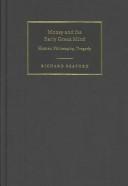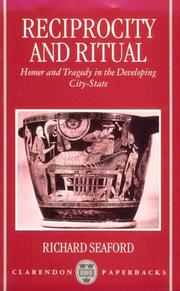| Listing 1 - 10 of 37 | << page >> |
Sort by
|
Book
ISBN: 9781474411004 1474411002 9781474411011 1474411010 9781474410991 1474410995 1474427146 1474426697 9781474427142 9781474426695 Year: 2016 Publisher: Edinburgh : Edinburgh University Press,
Abstract | Keywords | Export | Availability | Bookmark
 Loading...
Loading...Choose an application
- Reference Manager
- EndNote
- RefWorks (Direct export to RefWorks)
This volume brings together Hellenists and Indologists representing a variety of perspectives on the similarities and differences between the two cultures. It offers a collaborative contribution to the burgeoning interest in the Axial Age and will be of interest to anyone intrigued by the big questions inspired by the ancient world.
Self --- Philosophy, Ancient. --- India --- Greece --- Civilization --- Ancient philosophy --- Greek philosophy --- Philosophy, Greek --- Philosophy, Roman --- Roman philosophy --- Personal identity --- Consciousness --- Individuality --- Mind and body --- Personality --- Thought and thinking --- Will --- Philosophy, Indic. --- Indic philosophy --- Philosophy, East Indian --- Hindu philosophy --- History / Ancient / Greece --- Philosophy / History & Surveys / Ancient & Classical --- History / Asia / India & South Asia --- Philosophy

ISBN: 0415324882 9780415324885 0415324874 9780415324878 0203358015 9780203358016 9781134344468 9781134344505 9781134344512 Year: 2006 Volume: *2 Publisher: London ; New York Routledge
Abstract | Keywords | Export | Availability | Bookmark
 Loading...
Loading...Choose an application
- Reference Manager
- EndNote
- RefWorks (Direct export to RefWorks)
'Dionysos' is one of the most-studied ancient Greek gods for students and academics. He is popularly known as the god of wine and frenzied abandon, and has great significance for theatre -- drama, in fact, originated as part of the cult of Dionysos. However, Seaford's book covers a wider range of issues, such as mystery, cult and philosophy, which have been overlooked by many studies. As a volume in the 'Gods and Heroes 'series, this work will provide an indispensable introduction to the subject, or reference point for higher levels of study.
Comparative literature --- Dionysus (Greek deity) --- Gods, Greek --- Dionysos (Divinité grecque) --- Dieux grecs --- Dionysus (Greek deity). --- Dionysos (Divinité grecque) --- Dionysus

ISBN: 0198149492 9780198149491 Year: 1994 Publisher: Oxford : Clarendon press,
Abstract | Keywords | Export | Availability | Bookmark
 Loading...
Loading...Choose an application
- Reference Manager
- EndNote
- RefWorks (Direct export to RefWorks)
Greece in literature --- Griekenland in de literatuur --- Grèce dans la littérature --- Ritual in literature --- Ritueel in de literatuur --- Rituel dans la littérature --- Greek literature --- Greek drama (Tragedy) --- Epic poetry, Greek --- Literature and anthropology --- Dionysus (Greek deity) --- Ritual in literature. --- History and criticism. --- Cult. --- -Greek drama (Tragedy) --- -Epic poetry, Greek --- -Literature and anthropology --- -Dionysus (Greek deity) --- -Ritual in literature --- Anthropology and literature --- Anthropology --- Greek epic poetry --- Epic poetry, Classical --- Greek poetry --- Balkan literature --- Byzantine literature --- Classical literature --- Classical philology --- Greek philology --- History and criticism --- Cult --- Homer --- -Criticism and interpretation --- Greece --- Civilization. --- In literature. --- -Hóiméar --- Hūmīrūs --- Homeros --- Homerus --- Gomer --- Omir --- Omer --- Omero --- Ho-ma --- Homa --- Homérosz --- האמער --- הומירוס --- הומר --- הומרוס --- هومر --- هوميروس --- 荷马 --- Ὅμηρος --- Гамэр --- Hamėr --- Омир --- Homero --- 호메로스 --- Homerosŭ --- Homērs --- Homeras --- Хомер --- ホメーロス --- ホメロス --- Гомер --- Homeri --- Hema --- Pseudo-Homer --- Pseudo Omero --- Criticism and interpretation --- -Homer --- Homère --- Criticism and interpretation. --- Epic poetry [Greek ] --- Civilization --- Contemporary Greece --- Literature and anthropology - Greece. --- Hóiméar --- Greek literature - History and criticism. --- Greek drama (Tragedy) - History and criticism. --- Epic poetry, Greek - History and criticism. --- Dionysus (Greek deity) - Cult.

ISBN: 0521832284 0521539927 1107148774 0511185871 0511185049 0511313756 0511483082 1280449535 0511187718 0511186789 9780511186783 9780511187711 9780521539920 9780521832281 9780511185878 9780511185045 9780511483080 9781280449536 9786610449538 6610449538 9780511313752 9781107148772 Year: 2004 Publisher: Cambridge : Cambridge university press,
Abstract | Keywords | Export | Availability | Bookmark
 Loading...
Loading...Choose an application
- Reference Manager
- EndNote
- RefWorks (Direct export to RefWorks)
How were the Greeks of the sixth century BC able to invent philosophy and tragedy? In this book Richard Seaford argues that a large part of the answer can be found in another momentous development, the invention and rapid spread of coinage which produced the first ever thoroughly monetised society. By transforming social relations, monetisation contributed to the ideas of the universe as an impersonal system (presocratic philosophy) and of the individual alienated from his own kin and from the gods (in tragedy). Seaford argues that an important precondition for this monetisation was the Greek practice of animal sacrifice, as represented in Homeric Epic, which describes a premonetary world on the point of producing money. This book combines social history, economic anthropology, numismatics and the close reading of literary, inscriptional, and philosophical texts. Questioning the origins and shaping force of Greek philosophy, this is a major book with wide appeal.
Greek literature --- Money in literature. --- Greek drama (Tragedy) --- Epic poetry, Greek --- Economics and literature --- Economics in literature. --- Philosophy, Ancient. --- Money --- Littérature grecque --- Monnaie dans la littérature --- Tragédie grecque --- Poésie épique grecque --- Economie politique et littérature --- Economie politique dans la littérature --- Philosophie ancienne --- Monnaie --- History and criticism. --- Histoire et critique --- Homer --- Knowledge --- Economics. --- Greece --- Grèce --- Economic conditions --- Conditions économiques --- Littérature grecque --- Monnaie dans la littérature --- Tragédie grecque --- Poésie épique grecque --- Economie politique et littérature --- Economie politique dans la littérature --- Grèce --- Conditions économiques --- Arts and Humanities --- History --- Currency --- Monetary question --- Money, Primitive --- Specie --- Standard of value --- Exchange --- Finance --- Value --- Banks and banking --- Coinage --- Currency question --- Gold --- Silver --- Silver question --- Wealth --- Ancient philosophy --- Greek philosophy --- Philosophy, Greek --- Philosophy, Roman --- Roman philosophy --- Literature --- Literature and economics --- Economic aspects --- Hóiméar --- Hūmīrūs --- Homeros --- Gomer --- Omir --- Omer --- Omero --- Ho-ma --- Homa --- Homérosz --- האמער --- הומירוס --- הומר --- הומרוס --- هومر --- هوميروس --- 荷马 --- Ὅμηρος --- Гамэр --- Hamėr --- Омир --- Homère --- Homero --- 호메로스 --- Homerosŭ --- Homērs --- Homeras --- Хомер --- ホメーロス --- ホメロス --- Гомер --- Homeri --- Hema --- Pseudo-Homer --- Pseudo Omero --- Homerus --- GR / Greece - Griekenland - Grèce --- 331.151 --- 92 --- Geschiedenis. --- Histoire. --- History. --- 92 Geschiedenis. --- 92 Histoire. --- 92 History. --- Geldwezen in de oudheid --- Geschiedenis
Book
ISBN: 0846705729 9780846705727 Year: 1978 Publisher: Paris: Princesse,
Abstract | Keywords | Export | Availability | Bookmark
 Loading...
Loading...Choose an application
- Reference Manager
- EndNote
- RefWorks (Direct export to RefWorks)

ISBN: 0198150369 9780198150367 Year: 2003 Publisher: Oxford: Clarendon,
Abstract | Keywords | Export | Availability | Bookmark
 Loading...
Loading...Choose an application
- Reference Manager
- EndNote
- RefWorks (Direct export to RefWorks)
Greek literature --- Greek drama (Tragedy) --- Epic poetry, Greek --- Literature and anthropology --- Ritual in literature --- History and criticism --- Dionysus --- Homer --- Cult --- Criticism and interpretation --- Greece --- In literature --- Civilization --- Greek literature - History and criticism --- Greek drama (Tragedy) - History and criticism --- Epic poetry, Greek - History and criticism --- Literature and anthropology - Greece --- Dionysus - (Greek deity) - Cult --- Homer - Criticism and interpretation --- Greece - In literature --- Greece - Civilization --- Dionysus - (Greek deity)
Multi
ISBN: 9781108499552 9781108583701 9781108730815 Year: 2020 Publisher: Cambridge Cambridge University Press
Abstract | Keywords | Export | Availability | Bookmark
 Loading...
Loading...Choose an application
- Reference Manager
- EndNote
- RefWorks (Direct export to RefWorks)
"I define 'philosophy' as the attempt to explain systematically, and without relying on superhuman agency, the fundamental features of the universe and the place of human beings in it. This is not the only possible definition, but is the most revealing one for our period, in which we find the advent of 'philosophy' (or something very like it) in Greece, India, and China, and nowhere else"--
History of philosophy --- Greece --- India --- Philosophy, Ancient. --- Philosophy, Indic --- History.
Book
ISBN: 1108583709 1108606687 1108603157 1108499554 Year: 2020 Publisher: Cambridge, England : Cambridge University Press,
Abstract | Keywords | Export | Availability | Bookmark
 Loading...
Loading...Choose an application
- Reference Manager
- EndNote
- RefWorks (Direct export to RefWorks)
Why did Greek philosophy begin in the sixth century BCE? Why did Indian philosophy begin at about the same time? Why did the earliest philosophy take the form that it did? Why was this form so similar in Greece and India? And how do we explain the differences between them? These questions can only be answered by locating the philosophical intellect within its entire societal context, ignoring neither ritual nor economy. The cities of Greece and northern India were in this period distinctive also by virtue of being pervasively monetised. The metaphysics of both cultures is marked by the projection (onto the cosmos) and the introjection (into the inner self) of the abstract, all-pervasive, quasi-omnipotent, impersonal substance embodied in money (especially coinage). And in both cultures this development accompanied the interiorisation of the cosmic rite of passage (in India sacrifice, in Greece mystic initiation).
Philosophy, Ancient. --- Philosophy, Indic --- Ancient philosophy --- Greek philosophy --- Philosophy, Greek --- Philosophy, Roman --- Roman philosophy --- History.
Book
Year: 2016 Publisher: Edinburgh : Edinburgh University Press,
Abstract | Keywords | Export | Availability | Bookmark
 Loading...
Loading...Choose an application
- Reference Manager
- EndNote
- RefWorks (Direct export to RefWorks)
Explores the remarkable similarities between early Indian and early Greek philosophy. From the sixth century BCE onwards there was a revolution in thought, with novel ideas such as such as that understanding the inner self is both vital for human well-being and central to understanding the universe. This intellectual transformation is sometimes called the beginning of philosophy. And it occurred - independently it seems - in both India and Greece, but not in the vast Persian Empire that divided them. How was this possible? This is a puzzle that has never been solved. This book brings together Hellenists and Indologists representing a variety of perspectives on the similarities and differences between the two cultures, and on how to explain them. It offers a collaborative contribution to the burgeoning interest in the Axial Age and will be of interest to anyone intrigued by the big questions inspired by the ancient world. Key features: Brings together two supremely sophisticated ancient cultures that, despite their similarity, are almost always studied separately Indicates the kind of collaboration between specialists that is needed to move forward the stalled debate on the Axial Age Contributors include Paolo Magnone, Joanna Jurewicz, John Bussanich and Jens Schlieter.
Book
Year: 1978 Publisher: London Constable
Abstract | Keywords | Export | Availability | Bookmark
 Loading...
Loading...Choose an application
- Reference Manager
- EndNote
- RefWorks (Direct export to RefWorks)
| Listing 1 - 10 of 37 | << page >> |
Sort by
|

 Search
Search Feedback
Feedback About UniCat
About UniCat  Help
Help News
News